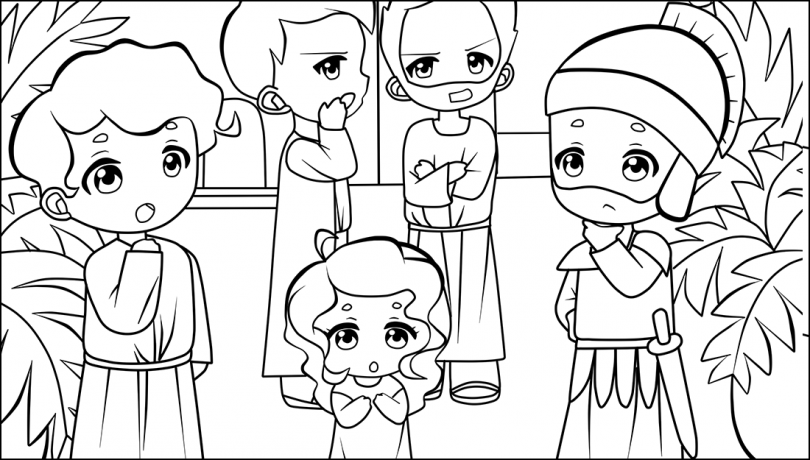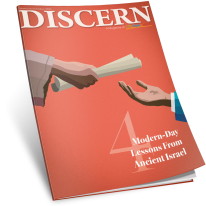Jesus once celebrated the Feast of Tabernacles even though people were trying to kill Him. Why was it so important to Him to attend that He went secretly?

PDF to print for family reading
As Jesus was growing up, He went to the festivals in Jerusalem with His family (Luke 2:41-42). He continued to obey the command to keep God’s seven festivals every year as an adult.
But as He became more well-known, His enemies got angrier at Him. Some people were confused by Jesus. Some thought He was deceiving people. Some were upset because He pointed out the things they were doing wrong. And others were angry because He broke some of the rules that people had added to God’s law.
The Jewish leaders were jealous of Jesus. The Bible says they hated and feared Him so much they wanted to kill Him!
“My time has not yet come”
In the fall when it was time to go to the Feast of Tabernacles, Jesus’ brothers seemed surprised that He wasn’t getting ready to go. Even His brothers didn’t believe that He was a teacher sent by God. So they told Him that He should go and impress people by doing miracles—if He was really able to.
Jesus told them to go without Him. “My time has not yet come,” He said (John 7:6). He knew that the leaders in Judea hated Him and wanted to kill Him. So He said, “I am not yet going up to this feast” (verse 8).
But after His brothers had gone, Jesus did go to Jerusalem for the Feast. But He went secretly, without drawing attention to Himself.
The Feast of Tabernacles starts with a holy day and lasts seven days. It is followed by another holy day on the eighth day. For the first several days, many people were looking for Jesus. Some knew He was good. Others thought He lied and deceived people.
The middle of the Feast
About the middle of the Feast, Jesus decided it was time to let everyone know He was there. He went to the temple and taught the people boldly. Again, some people were impressed and others accused Him of being crazy.
Some wondered if He was the King that God had promised to send. Others gave reasons they thought He couldn’t be the King. But they didn’t have their facts right. Jesus was born in Bethlehem, the town where King David was from. It is also the place where the Bible says the Christ would come from (verse 42; Micah 5:2). (Christ and Messiah are other words for the promised King.)
The Bible clearly tells us that Jesus is the One who will save and rule the world. He is the promised King. He came that first time to pay the penalty of death for us, so we can be forgiven for the wrong things we have done.
In this powerful sermon, Jesus offered to quench the deepest thirst that we have. Even more than water, we need God’s Spirit to help us live now—and live forever! God promises to refresh us if we believe in Him.
Jesus Christ also promised to come a second time. Then He will save the world from destroying itself (Matthew 24:21-22). He will become the King over the whole earth. His Kingdom—the Kingdom of God—is an important part of the meaning of the Feast of Tabernacles.
The last day
Jesus continued teaching the people through the rest of the Feast.
“On the last day, that great day of the feast, Jesus stood and cried out, saying, ‘If anyone thirsts, let him come to Me and drink’” (John 7:37).
In this powerful sermon, Jesus offered to quench the deepest thirst that we have. Even more than water, we need God’s Spirit to help us live now—and live forever! God promises to refresh us if we believe in Him.
The leaders sent officers to arrest Jesus. But the officers were amazed by what He said, and they didn’t bring Him back. The leaders asked, “‘Why have you not brought Him?’ The officers answered, ‘No man ever spoke like this Man!’” (verses 45-46).
So even though people wanted to kill Him, God protected Jesus throughout that Feast. Jesus knew that His time to be killed had not yet come. He still had more work to do before He would give His life as the Passover sacrifice in the spring.
What the festivals mean
Jesus went to the Feast of Tabernacles even when people were trying to kill Him. And Jesus and His followers continued to keep God’s festivals. Not only did God tell us to celebrate them, He also showed what they mean.
The last four festivals tell us what will happen in the future.
The Feast of Trumpets is about the time of the seven trumpet plagues. Jesus will return after the last trumpet is blown (Revelation 11:15).
The Day of Atonement pictures the time when our greatest enemy, Satan the devil, will be locked away (Revelation 20:1-3).
The Feast of Tabernacles is about God’s ruling over the earth. After the devil is locked away, the Bible says there will be 1,000 years of peace (Revelation 20:4). During this time, people everywhere will be keeping the Feast of Tabernacles (Zechariah 14:16).
The Eighth Day, also known as the Last Great Day, shows the time when everyone who has not had a chance to be saved will come back to life (Revelation 20:11-12). The people who never had a chance to obey God before will have their chance. God is a fair judge. But we can be very thankful that He is also a loving and kind judge! Everyone will have a chance to become a child in God’s family forever!
Learn more about all seven of God’s festivals in the article “The Greatest Story Never Told.”
Suggestions for discussion
Here are some questions to consider or discuss as a family:
- Why was the Feast of Tabernacles important to Jesus?
- Why does Jesus promise to come a second time?
- How will God quench people’s thirst?
For more on this holy day, read the article “The Feast of Tabernacles: A Bountiful Harvest.”





